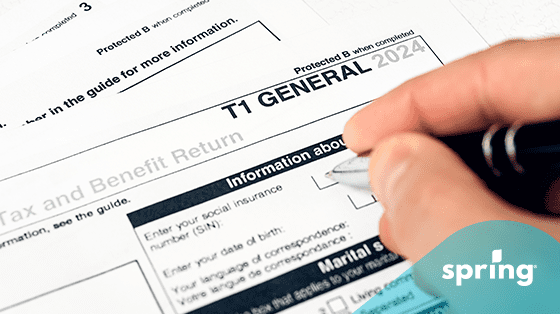This occurs on certain types of investments as well as property. However, when it comes to property, not everyone has to pay capital gains.
When it comes to property, there are also rules regarding how much capital gains you pay based on the amount you earn on the property. That said, let’s take a look at how this works and how you can avoid paying taxes.
How the Capital Gains Tax Works
In Canada, Capital Gains are taxed on capital assets when you earn an income from the sale. The amount you earn above your original purchase price is considered to be the total capital gain. The most common forms of these are investments and properties. You may be wondering how capital gains are different from traditional income taxes. Well, with capital gains, the whole amount isn’t taxed.
With traditional taxable income, the total income amount is taxed at your appropriate federal and provincial marginal rate. Capital gains are taxed differently. With Capital Gains, only the portion of the amount received from the sale that’s considered to be income is taxed. This amount is then taxed using the appropriate inclusion rate.
In Canada, there are two different inclusion rates: ½ and ⅔ when you owe capital gains tax. For corporations in Canada, the rate of ⅔ is used for all Capital Gains. When it comes to personal Capital Gains, the inclusion rate is ½ for amounts under $250,000 and all amounts over are taxed at the rate of ⅔. This means that only ½ or ⅔ of the income is taxed at your appropriate marginal rate.
Capital Gains & Property Sales
In Canada, any profit made on the sale of an asset like property is taxed using your Capital Gains marginal rate. That said, there are some exceptions. Properties that are considered to be your primary residence are exempt from the Capital Gains tax. This means that the money you earn from selling your primary residence isn’t considered income. What makes it your principal residence, though?
A primary residence is a home that fits into the ordinarily inhabited rule. This definition isn’t clear, but as long as you can establish that the home is your main place of residence, it qualifies for this exemption. There’s no timeline as to how long you have to keep the home in order to avoid capital gains taxes with the principal residence exemption.
How to Reduce Your Capital Gains on a Property Sale
In Canada, you’ll likely have to pay capital gains on any secondary residences that you sell, including investment property, rental property, and vacation properties. Unless you make this residence your primary residence, you’re going to have to pay Capital Gains. However, there are some ways that you can reduce the amount of capital gains that you’re going to pay. That said, a tax professional can also help you figure out how to reduce your capital gains.
Sell With A Low Income
One way to reduce the amount you pay in capital gains is by selling the second property when you have a low income. Why is this important? Well, this matters because the capital gains tax rates are your marginal tax rate. If you have a low annual income, then the amount of tax you’re going to pay is lower.
Here are the marginal tax rates for 2026
| Tax Bracket | Tax Rates |
| $58,523 or less | 14.0% |
| $58,523 to $117,045 | 20.5%, |
| $117,045 to $181,440 | 26% |
| $181,440 to $258,482 | 29% |
| More than $258,482 | 33% |
Offset Capital Gains
When it comes to capital gains, another way to reduce the amount that you need to pay is by offsetting them. You do this with capital losses. Capital losses occur when you sell an asset and lose money. In other words, when you sell assets for less than the adjusted cost base.
When it comes to capital losses, it’s also important to note that these don’t have to occur in the same year that you use them. You can use them for up to 3 years prior to or in future years. You might not think these make much of a difference either, but these capital losses reduce your overall capital gains, therefore reducing the amount of tax that you pay.
Track Property Expenses
When you’re selling capital property, different expenses usually occur. For tax purposes, these are referred to as outlays and expenses. These amounts can be deducted from your proceeds of disposition when you figure out your capital gain and capital loss amounts. The thing about these amounts, though, is that you can’t use these tax deductions against your other total income, only your capital gains and losses.
When it comes to outlays and expenses, the things that can be included are:
- Costs of fixing up the property
- Finders fees
- Commissions
- Brokers fees
- Surveyors fees
- Legal fees
- Transfer taxes
- Advertising costs
Use the Lifetime Capital Gain Exemption
While the lifetime capital gains exemptions aren’t available to everyone, for some, it can make a really big difference. It allows small business owners and their families to avoid a certain amount of capital gains taxes when it comes to selling business shares or farming and fishing property. It’s not made to reduce gains on personal property.
Use Capital Gains Reserves
In most cases, when people sell capital property, they receive the full amount at the time of the sale. However, in some cases, the funds are received over time. If this is the case, then you’re able to claim a reserve. This allows you to claim only a portion of the funds in the year that you receive them with regard to capital gains tax in Canada.
In some cases, you aren’t able to claim a capital reserve. These include:
- Not being a Canadian resident at the end of the tax year or in the following year
- Being exempt from paying tax at the end of the tax year or in the following year
- When selling capital property to a corporation, you have a say in
Use a Tax Sheltered Account
One of the easiest ways to avoid or reduce the amount you pay on your entire capital gains is to have them earned in a tax-sheltered account. These registered accounts include Registered Retirement Savings Plans, Tax-Free Savings Accounts, First Home Savings Accounts, and Registered Education Savings Plans.
The reason that you don’t have to pay a capital gains tax liability on these amounts is that all of these accounts are tax-deferred or allow for tax reduction. However, this only works for investments and not property.
When it comes to property, you can reduce the capital gains tax owed by investing in registered tax-deferred accounts. For example, any funds you invest into RRSPs are invested at a pre-tax amount. This means that any investments you make will have the tax you pay refunded to you. So, if you invest money in the same year that you earn capital gains, then these will combat against each other and reduce capital gains tax amounts on your tax bill.
Avoiding Capital Gains on Inherited Property
Capital gains work slightly differently in Canada when it comes to inheriting property. This is mainly due to the fact that there is no inheritance tax in Canada. Normally, if a property isn’t your primary residence, then you have to pay capital gains tax for that property. However, this works a bit differently with inherited property.
If you inherit a property in Canada and sell it immediately, you only have to pay a capital gains tax if the property wasn’t the deceased’s primary residence. If it were, then no capital gains need to be paid. However, if it wasn’t their primary residence, then the capital gains tax would be paid out of the estate on their final tax return. That is, if it doesn’t qualify for the lifetime capital gains exemption. This is because when a person passes away and does their final tax return, the assets are deemed to be sold at fair market value even though a property sale didn’t happen.
When it comes to other investments that earn capital gains, these amounts aren’t paid by those who inherit them. Because Canada has a progressive tax system, they’re paid by the deceased person’s estate. All capital gains are taxed based on the deceased person’s marginal tax rate also known as tax brackets. It’s then paid by the estate on their last tax return.
Avoiding Capital Gains In Different Provinces In Canada
In Canada, Capital gains are a federal tax and not a provincial tax. This means that the rules for capital gains are for everyone in Canada, not just those in certain provinces. Unfortunately, there are no specific provincial capital gains rules, so where you live in Canada doesn’t make a difference. You can only minimize capital gains taxes by using the methods allowed by the federal government.
Deferring Capital Gains Taxes
When it comes to capital gains in Canada, when you can’t avoid them, another option is to defer capital gains tax. That said, this strategy is only available if your current or former spouse or common-law partner gives you shares in death or divorce. In this case, you won’t pay capital gains until the shares are sold. However, the profit or loss isn’t calculated from when you get the shares but from when your spouse purchased them.
Capital Gains On $100,000
How much you pay in capital gains depends on which inclusion rate you qualify for. In terms of personal capital gains, all capital gains under $250,000 are taxed at an inclusion rate of ½. This means you pay tax on $50,000. However, how much tax you pay on this amount is based on your personal tax rate. Here are some examples based on your marginal tax rate where we calculate capital gains tax.
| Annual Taxable Income | Marginal Tax Rates | Total Tax |
| $55,000 | 14% | $7,700 |
| $75,000 | 14%, 20.50% | $11,571.01 |
| $120,000 | 14%, 20.50%, 26% | $20,958.53 |
Not Claiming Capital Gains
In Canada, it’s important you file your taxes correctly and claim any income earned every year. While not doing so may save you money in the short term, in the long term, it can be very costly. Not only will you be liable for any amounts you owe, but you will also be liable for the interest earned on these amounts.
On top of having to pay extra on these tax amounts, it can also be possible to be charged with tax evasion. This is a federal penalty and can result in extra fines and, in some cases, even jail time. This is why it’s important to do your taxes property as well as make your tax payment when you owe taxes.
Difference Between Realized And Unrealized Capital Gains
When it comes to capital gains, it’s important to understand that there are two main types. These two types are realized and unrealized capital gains. Realized capital gains are the capital gains that are real. This means that you’ve already sold the asset and you have made a profit. Realized capital losses are similar in the fact that you’ve already sold the asset and know what you have lost.
When it comes to unrealized capital gains, these capital gains are predicted but haven’t happened yet. The same idea applies when it comes to unrealized capital losses. You don’t pay any taxes on these because they haven’t happened yet, so there is nothing yet to claim.
Can You Deduct Realtor Fees from Capital Gains?
When you do your taxes in Canada, there are certain things you have to claim, like rental income, capital improvements (capital cost allowance) and anything else that will affect your tax implications. With Canadian tax law, when you’re selling property that isn’t your primary residence, you will have to pay capital gains tax.
These taxable capital gains occur only if you make a profit on the property. This means that you can deduct any eligible expenses, which include selling expenses, from your total profits. This can help reduce your tax burden.
Capital Gains Tax Minimization by Province
The tips to reduce the amount of capital gains tax you pay are the same federally. This means that all provinces have the same rules. This occurs with all types of capital gains, including deemed disposition and the current property value. Whether you’re dealing with a traditional property or a cooperative housing corporation, capital stock, or just one housing unit owned, it’s all the same. If the property qualifies as your principal residence, then you don’t have to worry about capital gains.
The most common way people reduce capital gains is on a tax-deferred basis with tax-deferred accounts. These are commonly the First Home Savings Accounts and RRSPs. If you inherit a property, even if there are no inheritance taxes, a deemed disposition will occur. Business income and deductions can also reduce some of the costs.
Final Thoughts
In Canada, capital gains are paid on assets that you sell and are able to earn a profit. However, not all assets are eligible for capital gains. Any property that is considered to be your primary residence is exempt from any capital gains. Any property that you inherit in Canada that was the deceased’s primary residence is also considered to be exempt from capital gains.
Another form of asset where capital gains tax applies, according to tax rules, is investments. On these investments, you pay capital gains; you could reduce your capital gains or eliminate them altogether. You can do this by putting your funds into a tax-sheltered account. Due to this, you can eliminate or reduce your tax liability.









